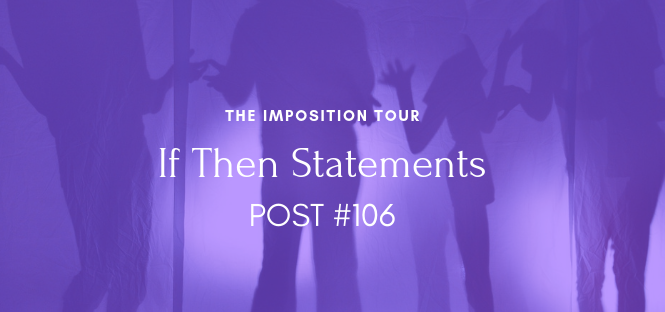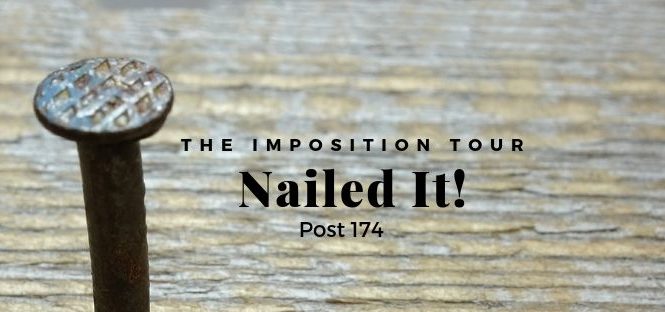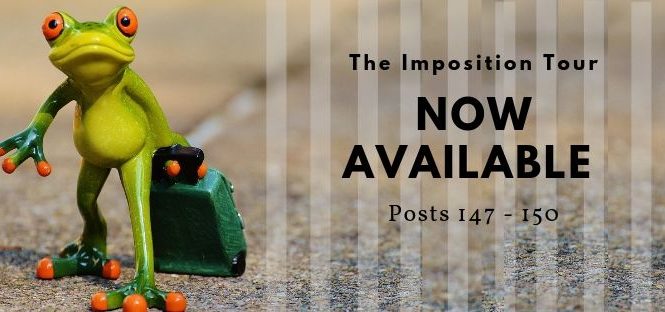Something I’ve discovered about myself is that I can be a very conditional person.
I think it’s partly because I’m a linear thinker, and, I like black and white realities better than “gray areas” with loads of variables that you have to consider. And, I like to apply logic to the things that stress me out the most. I’ve always believed if I can name my fears, then I can invent a strategy to at least cope with them. For me, safety often resides in my logical understanding of my situation.
However, I do love hiding juicy details and circumstantial ironies in my fiction stories for a reader to discover at the perfect time. For me, hiding hooks and surprises in the narrative is the most satisfying part of writing a novel! The thing is, I always know the through-line of my character’s reality when I write my fiction books. I never lose track of the details for even my most lost and wandering characters. I know how to weave the good with the bad when the flow of the story is up to me, and to me alone.
But I simply couldn’t find God’s through-line for me in my real life when we moved to Utah. I couldn’t see the logical flow of the details, and I was lacking a sense of strategy at play for all that I was feeling. All I could see in my life was one huge, ugly gray plop of circumstances that made me feel dead inside. So I spent a lot of mental energy teasing out the black and white elements that made up the gray.
I think I believed if I could call out the possible shifts in my circumstances that could change things up for the better, then I might actually be able to picture things differently. As a result, my self-talk took on this whole very familiar qualification system in an effort to find some hope to cling to…
For the first three months of our time in Utah, Lou and I lived in a string of hotel rooms, and in this very dark and gloomy ski rental house at the base of Little Cottonwood Canyon. The filings for the new company were taking forever, and the financial strain Lou and I were putting on Henry and Jim was always on my mind. So eventually, we moved into Henry’s basement apartment — which was incredibly luxurious and created an element of much-needed comfort in my life.
[Side note: Henry’s wife and two children are the most significant highlight of moving to Utah. I love them deeply…]
But my ability to gracefully impose on Henry and Jim was reaching a breaking point. Even though I knew I was welcome in Henry’s home, I still felt like a squatter. And, the pressure of waiting on things to line up for Lou’s role in the company completely smothered me at times.
In the early days, I did my best to write the investor deck — but it’s a very specific kind of writing (just like scriptwriting), and I never felt like I was getting it right. I would lose days of my life writing about things I didn’t fully understand, and I’d often feel wooden at the end of the day because my efforts to write were draining me so much.
I remember feeling so sad and strung out by our circumstances that I started trying to look ahead to the future with a series of “if-then” statements to help me cope. I felt certain that if my circumstances would change by even the slightest bit, then I’d have what I needed to finally be content. Here are just a few of the statements I told myself:
If the company gets funded, then Lou and I can make Utah feel like our home.
If we can afford our own place to live, then I can be a better version of myself.
If I could just access some of my sweaters and jeans in the storage container, then maybe I will finally feel warm and safe in this chilly town.
If Lou can officially start his role as CEO of the new company, then I can completely focus on Eloise…
The fact that every statement I made to myself started with an “if” instead of a “when” just proves how shaky my faith was about any possibility in my life. Even though “if then” statements had always been my go-to coping strategy in the past, at this time, I felt the hope for something to make sense draining right out of me…
And, I started to feel inconsolably cold all of the time.
There was also one other terribly dangerous “if then” statement that I started saying to myself. This one is tricky for me to admit… So please give me some grace.
If I stop eating, then I’ll feel like I’m in control.
Eating is a really powerful part of living. It’s something we all need to do to survive, but it can also be the center of a lot of focus that can easily tip into a place of imbalance. This is very true for me.
I’ve written this statement before in this blog, but I want to say it again. My emotional default settings are fear and scarcity when life gets stressful. I’m hardwired somehow to default to a place where I believe I should hide or maybe disappear when I’m frightened or uncertain. I seek ways to take up as little space as I can, and I feel safer if I can make myself less instead of more.
You can’t really hide from anything in your life for very long — and I’ve always known that. Even if I don’t want it to, the sun always comes up in the morning, and it always sets in the evening. Without my permission, one day always fades out as another one shines back into my awareness. (Which is something I take for granted — even though I’ve had seasons of my life where I’ve resented it.) But for me, this life cycle leaves no choice but to wake up and keep trying every single day.
However, at this time, my efforts felt like they were getting me nowhere, and I started to lose my conviction that all of my trying was even making a difference. I still trusted that God had some sort of plan, but the details of His plan were so allusive and mysterious that I felt like hope was my enemy at times.
And, I felt like I had no say in any part of my life, and for some reason, the less I ate, the better I felt. Plus, I wasn’t costing anyone any extra money if I didn’t eat… And, it made me feel happy to be so physically empty. It was kind of a logical win-win in my twisted little mind.
So at first, I just skipped eating a little bit here and there.
Lou and I are total opposites in that Lou feels comforted by eating something delicious, whereas food can sometimes stress me out or make me feel sad. But our compressed togetherness — and the lack of any movement in our situation — meant that mealtime was kind of the biggest part of our day. So whenever I was with Lou, I ate. But nothing felt good inside of me. I developed this self-loathing feeling when I ate “too much,” but I had no way to sort it all out at that time.




